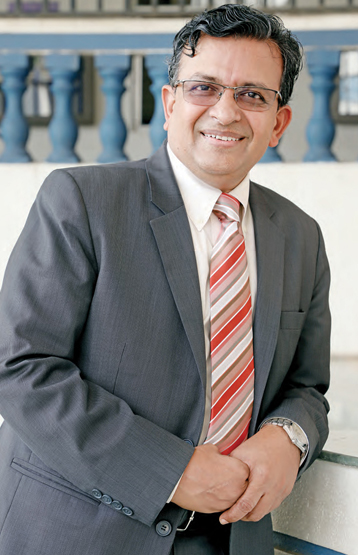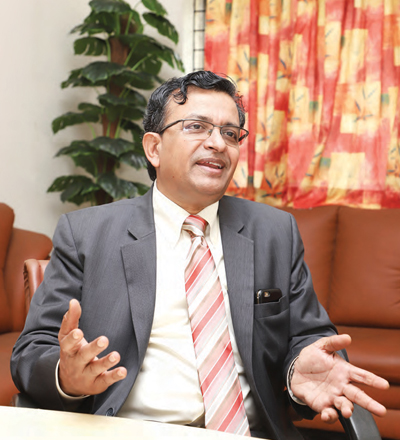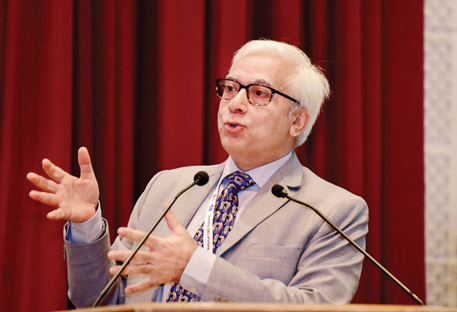Learning & Develeopment in a post-pandemic world

Crucial lessons for learning in a volatile and constantly changing global environment
Change is the only constant in the world. Unless you are constantly learning, you will fall by the wayside or perish. This is especially applicable to the field of HR. The NHRD Network, Pune Chapter, recently hosted its 7th national L&D Summit, where thought leaders S V Nathan, National President, NHRDN and Bharat Wakhlu, Founder, the Wakhlu Advisory (TWA), shared their insights and perspectives on what the future might hold for Learning & Develeopment (L&D) practices in the post pandemic world. Corporate Citizen brings you the riveting session.
S V Nathan
"What are the most significant driving factors of making these learning work for tomorrow? None of this is an isolation. Once upon a time we used to say we mandate so many hours of learning. Today we don’t do that. If you do not learn you do not survive"
- S V Nathan
 S V Nathan
S V Nathan
Future lies in learning
I think the future of any organisation lies in learning. What happened yesterday is the past. The shelf life on the half-life of learning is now almost six months for skills. Can you imagine what it would be for us who believe that we have to keep up? So it’s almost like you have to run really fast to stay in the same place. Organisations of Tomorrow have but only one thing to do which is to see what we can do for learning. How can we evolve as a person who goes through all kinds of person training to perhaps one on a digital platform? What happens in a hybrid work? What happens when you move from one particular job to another particular job and you have no idea how to do that? Sometimes all we have to do is prioritise looking at all our skills that we have. And by the way we don’t have all the answers. as practitioners people who’ve been in the industry for a very long time, sometimes I feel so inadequate and I’m in amazement of the people who have forgotten the requisite skills and knowledge and just the sheer energy and the will to do much more and I ask myself, “Can I ever even match to about two percent of what they have?” Obviously they’re doing something right. They’re reinventing themselves. So in this era what is the new reinvention for ourselves? Do we look at gamification? Do we look at automation? Do we look at digital learning? Perhaps we can look at learning. Perhaps we can learn from what others loosely called social. What can we really do about deep learning and there are a lot of new things like neural networks reinforcement learning?
Adapt or perish
Currently we’ve always believed that learning is doing that is that correct and I don’t know. Some of the big answers that we have are inadequate to respond to the questions of tomorrow today. What are the most significant driving factors of making these learning work for tomorrow? None of this is in isolation. Once upon a time we used to say we mandate so many hours of learning. Today we don’t do that. If you do not learn you do not survive. But the one learning that I’m going to be speaking to you today is something I will explain through a story.
"Some of the big answers that we have are inadequate to respond to the questions of tomorrow today. What are the most significant driving factors of making these learning work for tomorrow? None of this is an isolation"
- S V Nathan

The Goatherd’s promise
It so happened that there were three people who came to a King dragging a young man and complained to the King that this man has murdered their father? “Why did you kill their father?” asked the king. I’m a goatherd, he replied. My goat ate from their father’s farm and he threw a stone at my goat and it died. So I took the stone and threw it at the father and unfortunately the person died. “Aha, you killed a man and because of this I passed a judgment on you on charge of murder by sentencing you to death,” said the king. The young man froze. He said “King I accept what you say. All I ask for is three days before you execute the judgment. My late father left me some wealth. I have a sister to take care of and if you kill me now, my wealth and my sister will have no guardian. So I want to go back to the village, appoint a guardian, let my sister know and I will come back. “What is the guarantee that you will come back,” asked the king. I have some person who could possibly stand as bail for me, said the young man. “Who will stand for you?,” asked the King. Suddenly in that crowd was a young man who said, “I will stand for this gentleman”. The king accepted and the young man left. He knew that he had only three days because on the third day if he did not come then it will happen that the person who stood in as bail for him will have to die in his place. By the third day, there was no sign of the young man and everybody was afraid for the person who stood bail. The village had gathered and the man who stood bail was ready to accept the penalty of death. Just before sundown the person who was the goatherd came running, looking very exhausted, and stood in front of the King and said, “King, I am here. I’ve handed my wealth and assigned the welfare of my sister to my uncle. I am here to receive the penalty of death. You may execute me now.” In great shock and surprise the king said, “Why did you return, because you had a chance to escape the death penalty.” The young man said, “I was afraid that if I did not come, it would appear as if humanity has lost its integrity and the ability to fulfil somebody’s promise that was kept. And that’s why I came back.” “And why did you stand guarantor for him,” the king asked the person who stood bail. He replied that he was afraid that if he didn’t, it would appear as if humanity would have lost the will to do some good for others, that’s the reason why he stood up.
These words moved the complainant, ie, the brothers who were asking for the death for the goatherd. They said that they forgive this young man. The king was annoyed with the brothers because the goatherd had killed their father. The king asked why? the brothers said, “We are afraid that it will appear as though forgiveness has lost its place in the heart of humanity”.
I am sharing this beautiful message and passing it to you. It reminds us that goodness has a place in our hearts and all that we have to learn is that can we learn a little bit about humanity?
Bharat Wakhlu
"We can only create leaders in every part of the organisation who have the ability to respond quickly who are adaptive and who are in a position to ensure that despite what’s happening outside, they have the resilience to quickly bounce back along with their teams"
- Bharat Wakhlu
 Bharat Wakhlu
Bharat Wakhlu
Evolution of training
I took over as the head of Technical Training for Tata Steel in 1992. That is a very long time ago. Augmented reality of course wasn’t around nor was virtual reality, but what we had started to do at that time was we had actually started to create simulations on computer to enable the workforce of Tata Steel. The workforce was able to work on computers and actually get a sense of what they had to do in the pulpits of the rolling mills or the blast furnaces that they were supposed to manage. So training has also come a very long way and as was mentioned by Mr Nathan there are so many changes that are taking place to enhance the domain expertise and the knowledge of people who are critical to the manufacturing sector and a variety of other jobs in organisations. But I am not going to be speaking about domain expertise today. I am going to be speaking about two things. I will be speaking about the need for creating leaders across the organisation and I’ll be speaking about the things that organisations need to do to enable leaders to be created across an enterprise. Now why leadership in particular? Because in my opinion in my long years in the corporate sector and even outside of it, I have realised that if there is one thing that makes a difference to the future of an enterprise or a nation or a state, it is outstanding leadership. Therefore, my whole emphasis will be on what it is that we need to do collectively to make sure that people rise to the occasion and actually show the kind of behaviour that are essential to take their organisations into the uncertain future.
A rapidly changing world
The fact is that we are undoubtedly facing unprecedented changes and challenges. Nobody can predict what is going to be needed in a few months-the kind of skills and capabilities and competencies that you might need. Some are about to be more stable but many others are bound to change and there is no guarantee that what you know today will be of any use to you tomorrow. So, there is undoubtedly a lot of change happening. There are disruptions that we know about, there are crises, not just the Covid pandemic or the climate crisis. There are resource outages. A ship got stuck in the Suez Canal about a year ago and half the automotive industries in Pune shut down. Now you might say what’s the connection, but there is a connection of course. Supply chains are global. The resources that are used in India come from elsewhere. The resources that are used in other parts of the world are coming from other places. People’s aspirations are changing. People are resigning and joining companies completely unrelated to their training or their professional skills, simply because they want more meaning. Their aspirations have changed. They’re looking for something different. They’re looking for more joy and happiness and more work-life balance in their lives. Technology is a destructor as well and therefore we are dealing with changes that none of us can imagine. We can imagine them in their individual capacities, but nobody can imagine what’s going to happen when technology impinges on resource shortages or on talent shortages or other kinds of crises. We got a glimpse of it during the pandemic but that is only a very tiny little glimpse. So what is it that we as leaders or we as people organised for delivering something to our customers, need to do about this? I think first of all we have to understand that it is an extremely dynamic environment.
"The fact is that we are undoubtedly facing unprecedented changes and challenges. Nobody can predict what is going to be needed in a in a few months-the kind of skills and capabilities and competencies that you might need. Some are about to be more stable but many others are bound to change and there is no guarantee that what you know today will be of any use to you tomorrow"
- Bharat Wakhlu

Leaders must respond fast
We can only create leaders in every part of the organisation who have the ability to respond quickly-who are adaptive and who are in a position to ensure that despite what’s happening outside, they have the resilience to quickly bounce back along with their teams. Now these are all leadership capabilities and I am therefore of the view that organisations have to be committed to creating a large body of decentralised leaders across the organisation in different functions and they have to be trained or they have to have the capability to rise to the occasion irrespective of what the outside might hold. Now, what are the kind of behaviours that we are talking about? I typically cite six behaviours which every single leader has to have, if the leader has to truly deal with a uncertain environment, lots of disruptions and so on. First and foremost leaders have to understand that if change is happening, they must be able to recognise change. Now you might think this is extremely basic. Well it’s basic, but today the changes in some areas are dramatic, in many others are extremely slow and not so discernible. But, we as leaders have to understand that something is changing and we have to use whatever tools that we have, right from data analytics to trend assessments and so on, to know that there is a change happening. Our customers want something else, the stakeholders are demanding something else. Their ability to quickly receive that is critical. So exposing the need of change and knowing what kind of change is happening is important. When leaders understand that change is happening they have to change themselves, their organisations, and their processes. They have to therefore envision the kind of things that they have to create for the future-that is also a leadership ability which is extremely critical in this day and age.
They also have to start to enlist people. How will they bring something to fruition unless people are part of their team, unless people buy into what they’re doing, until people do not engage with them and feel a part of what it is that is being done by the organisation. So, after the enlisting process these people have to be empowered to be able to be self-reliant, to be able to run on their own with the skills and that’s where the domain expertise comes into play. They have to be encouraged to deliver with the right kind of systems and processes in the organisation that support a change and transformation. The leaders themselves have to exemplify and to be role models to everybody else in the organisation, if they really need to make a lasting change. So in that sense, the Learning and Development engine has to focus on creating these competencies across the organisation. The importance of adaptive leadership cannot be overemphasised for the simple reasons that, that alone will help the organisation to strategically move towards the new normal. The new areas that the companies will have to focus on. This requires leaders to ask the right questions. It enables them to think strategically and really think of new ways to meet the expectations and aspirations of not just their clients but also people inside the organisation. At the same time there’s also a need to look at the tactical requirements within the organisation. Beyond the domain expertise which I mentioned, is bound to be very critical, but which we will take as something every organisation is going to focus on. So at the tactical level there is also a need for every function to understand what the competencies are and capabilities that will deliver the kind of results that are required by customers.
"there are three things to be learned. The first is there is a need for creating leaders. Secondly, leaders must identify the change on the backdrop of changing trends in L&D and thirdly, for this organisations must enable leaders to create and run L&D engines"
- Bharat Wakhlu

Tracking improvements
We talked about the leadership level requirements and that’s a huge investment which every organisation has to make and at the same time the learning and development engine has to run continuously to help every function focus on the tactical competencies and capabilities required to meet the business results that are critical. At the same time we also need to create the processes to track the improvement in competencies and skills, unlike in the past where we might have had groups going for training. We now have to be familiar and comfortable with the idea of incentivising the individual level training. Which means, just like how we in the 1990s taught our foremen on the simulator or on the computer, in the same way digitised training and learning in their own time is going to be a very critical requirement of skill development, at the pace at which people are comfortable. So we need to create those learning opportunities for people to be able to learn at their own pace and when we talk about enhancing learning opportunities that means the organisation has to quickly adopt new technologies, which are like AR and VR. We have to also make sure that code change becomes an integral part of what we offer. Mentoring, simulations, gamification, apprenticeship, training, on-the-job training and a host of other creative things need to be thought of, because if you don’t do that you will still be using archaic methods to deal with an environment that is changing rapidly and where the expectations of the people who work for you are also changing.
There is a great need for the boards to also engage very actively with all of you here because if the board decisions are going to make a difference to how people have to be managed and how they have to be treated. You must be the first ones to know about it. But too often the board sometimes takes decisions which are not communicated and there is no forewarning and people get demoralised, people feel cheated and that is not the way in which you can be an outstanding L&D professional.
We must focus on leadership development across the organisation. We must focus on tactical ways to enhance the key competencies required by people to deliver what is required by each function. create a leadership development and Learning and Development engine which is continuously running in the organisation-which leverages technology, which ensures that all the effective ways of self-learning are reinforced. We must also add coaching and mentoring to the process, give stretch assignments, give on-the-job training, make sure that everybody is learning and incentivise individual learning. Anybody who comes into the organisation has got to learn and learn not just to be relevant in the larger context, but in the organisation as well. People need to know exactly what it is that the organisation wants of them. And, for the young budding leaders of tomorrow sitting in the back benches, I want to tell you that don’t you ever think that the organisation is responsible for your development or your learning. You, my dear young friends, are responsible for your own growth and development. Yes, good HR executives will help you and they’ll facilitate your growth, but at the end of the day, never think that your organisation will do anything for you because they just cannot. It’s humanly impossible. You must do it yourself. You be responsible, you be capable of delivering the best that your customers want from you. You make sure that you’re ready to serve in the most difficult conditions and that would be that your customers want you to make sure that you’re ready to serve in the most difficult conditions and that would be the way to bring your skills up to speed.
‘Just in time’ training
So let me now wrap up with one little story from the time I was the head of training for Tata Steel. At that time a lot of the training used to be done which was considered to be “just in case training”. Which meant that three years down the road there might be something which will come up, so it was best to prepare our managers for it today. When I took over as the head of training I said, “Just in case” training is out. When I was asked why, I said that instead of wasting energy and time of executives on something that may happen, why don’t we instead give “Just in time” training for the things that are required today and would enable the performance of the company to be heightened now? A lot of people of course found this a little revolutionary even at that time, but looking back I realised that it was the right thing to do, because today anybody who talks about “Just in case” training has already lost my attention. Today is the era of ‘Just in time’ training not ‘just in case’ training, because the world is changing so rapidly, there are only a few large blocks that you can play around with and that’s what your role is going to be, all else that exists will have to evolve.
In summation, there are three things to be learned. The first is there is a need for creating leaders. Secondly, leaders must identify the change on the backdrop of changing trends in L&D and thirdly, for this organisations must enable leaders to create and run L&D engines.